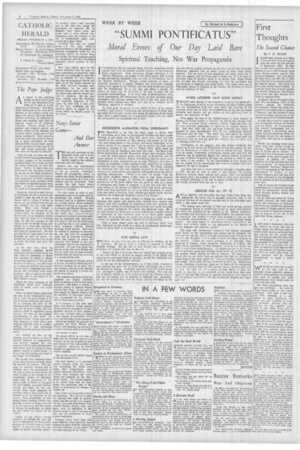Page 4, 3rd November 1939
Page 4

Report an error
Noticed an error on this page?If you've noticed an error in this article please click here to report it.
Tags
Share
Related articles
The Progress Of The War
The Day That We Took Franco At His Word
The True Test
Book Of The Week
Utopias Unlimited
WEEK BY WEEK
By Michael de la Bedoyere I
"SUMMI PONTIFICATUS"
Moral Errors of Our Dqy Laid Bare
Spiritual Teaching, Not War Propaganda
IT is surprising that the national Press, with few exceptions, should content itself with the shortest possible summary of contemporary Papal Encyclicals. These documents, though addressed to the Catholic Hierarchy, are spoken to the whole world, and in them all men can find the authentic voice, not only of Christendom, but of our Western Civilisation. Though certain portions of them are naturally couched in a deeply. religious and devotional language, making their appeal to the faithful, each one deals boldly and bravely with the fundamental ills of our time and offers a remedy, the efficacy of which may be discerned by all men of good will and reasonable understanding. If we think only of Quadragesimo Anno, Divini Redemptoris, Mit Brennender Sorge, we have spiritual, moral, philosophic and political counsel that goes to the very roots of the troubles whose consequences affect each one of us, whether we be Christians, agnostics or atheists. To these great documents is now added the first of the present Pontifical reign, Summi Pontificatus, the circumstances of whose issue, one might have thought, would alone arrest the attention of the world. Alas! after a rapid search for a sensational phrase and any useful war propaganda our journalists toss it aside.
PROGRESSIVE ALIENATION FROM CHRISTIANITY
THIS Encyclical is the first for many years to devote itself I ex-professo, as it were, to international troubles and their causes. Writing, as war broke out, Pius XII, whose every effort had been directed to the prevention of this calamity, has sought to lay bare " the road which leads to the spiritual and moral bankruptcy of the various efforts of the present day " and to explain the basic moral principles, founded in the Law of Nature itself, which alone can save us all from the headlong rush down this road. The Encyclicals, Divini Redemptaris and Mit Brennender Sorge, were intended chiefly to warn the world against patent evils, such as Bolshevism and the pagan element in Nazism; Summi Pontificatus, like the great social Encyclicals, is more concerned to set up right Christian principles of conduct in opposition to false doctrines whose plausibility or apparent inevitability may tempt even sincere persons. The Pope, rejecting the commonly held view that economic injustice is the only root of modern evils, demonstrates how spiritual and moral errors can lead to appalling consequences. " While it is true," he writes, " that the evils which mankind suffers to-day come in part from economic instability or the struggle of interests as regards the more equal distribution of the goods which God has given to Man as a means of sustenance and means of progress, it is not less true that their roots belong to the spheres of religious belief and moral conviction, which have been perverted by the progressive alienation of peoples from that unity of doctrine, faith, customs and morals which was promoted by the tireless and beneficent work of the Church." In other words, the Holy Father is telling the world in plain language that society and nations have reached their present pass because they have preferred to experiment with new spiritual and moral forces instead of maintaining the spiritual and moral principles which governed civilisation for nearly two thousand years. He is not only saying that there must be more Catholics or a greater fervour th of Caolicity or that Catholics must be on their guard against ag panism; he is saying to the world that there is no hope unless it restores the spiritual and moral foundation of Christendom. Fifty or even twenty years ago such a challenge might have been dismissed by the world as a piece of ecclesiastical archeology ; to-day it shows itself to be simple commonsense.
OUR MORAL LAW
THE Pope, we may even say, has no difficulty in working out his argument. He has no need to indulge in research or invoke complex theology. He has but to look around him, picking out examples and lessons that leap to the eye.
" Before all else it is certain that the radical and ultimate cause of the evils which we deplore in modern society is the denial and rejection of a universal form of morality, as well for individual and social life as for international relations." In the age of the Enlightenment, as was called, progressive men rejected the moral law of Christianity and sought for a better one founded in Reason. Invincibly optimistic and full of self-conceit they envisaged a golden age of man's own making. But this one law of Reason turned out to be a thousand and one different laws to suit, not the reason, but the passions of different men. Inevitably, not only the laicisecl State, but the family and the individual on the one side and the society of States on the other, for all their admirable intentions, dissolved into as many pieces as there were human passions. For an error of this magnitude and scope there can be only one remedy, and the Pope puts it before us. It is to find the universal form of morality again in its source, God, whose Divine Son founded the Church, entrusting her with the revelation and guardianship of dogmatic and moral truth. The whole error can be historically traced to disbelief in the Church, the Divinity of Christ and the existence of God.
WHERE MODERNS HAVE GONE ASTRAY TUNING more directly to the immediate causes of the catastrophe, tRhe beginnings of which we are witnessing, the Holy Father points out two fundamental evils that arise from this rejection of the universal moral law of God : the forgetfulness of the law of human solidarity and charity, and the divorce of civil authority from its source, the authority of God. Once again, the men of the Enlightenment in their worship of Reason and Nature sought to intensify the feeling that all men were one. They preached justice, toleration, liberty, happiness, each one of these universal conceptions or rights to be enjoyed equally by all. And they held that this universal brotherly love could be attained by mere emancipation from all ties, restrictions, national differences and the like. The result has been stated by Anatole France, a product of this philosophy " When one starts with the supposition that all men are good and virtuous, one inevitably ends by wishing to kill them all." Christianity, on the contrary, sees this human solidarity and charity in its real causes, the Fatherhood of God who created all men and the Brotherhood of Christ who came to redeem all men. Seeing rs it in its causes, Christianity understands exactly how and why this solidarity can be preserved, despite the constant natural temptation for men to divide themselves off from one another in order to gain the better of one another. In the forgetfulness of these causes has lain the reason for the nationalism and economic struggle that have disgraced the age of progress. And from this loss of moral solidarity through a common effort to fulfil the law of God, in spite of and through the natural differences between races, nations and people, there has developed the second error : the attempt of the State to force upon its subjects the artificial solidarity of its will to power, wealth and conquest, a will wholly divorced from the law of God. LESSONS FOR ALL OF US ANDso, logically and inevitably, the Pope draws from these considerations the lesson that is specially applicable both to the errors at the root of the present anarchy and to the principles upon which a just peace must rest. " The human race, although divided into social groups, nations Or independent States, is nevertheless bound by moral and juridical ties which are ordained to the welfare of all. Mutual confidence, the provision and persuasion of reciprocal fidelity, the plighted troth, the conviction that wisdom is better than weapons of war, are the indispensable presuppositions of all peaceful neighbourliness among people." And these cannot be maintained unless " anchored to the Divine Law without which we are abandoned to the caprice of private interests and collective egoism." This long and fundamental document will require prolonged study before its full implications and lessons can be gathered, but even now we can say that its ultimate importance does not lie in the use that may be made of it in order to point the finger of scorn at our enemies. (There are indeed passages in it, especially those referring to Poland, whose immediate application is evident, and many others, suppressed by Nazi Germany, which no less clearly can suffer a very direct interpretation.) Its importance lies in the revelation of spiritual, moral and political errors which are at the basis of our modern world, British as well as German. Its lesson is not simply that we are better than our enemies, but that our civilisation cannot hope to rise again unless the " unity of doctrine, faith, customs and morals which made Europe is restored to all of us. Bolshevism, Nazism, Socialism, Capitalism, these are the fruits of the widespread errors that resulted from the 19th century divorce between man and his God. We shall not rid ourselves of them unless we also, not merely in idea but in our practical, public, social lives, seek once again in God and His Church the genuine foundation upon which to rest the hopes of mankind in this age. of material progress and vague good will.
blog comments powered by Disqus











